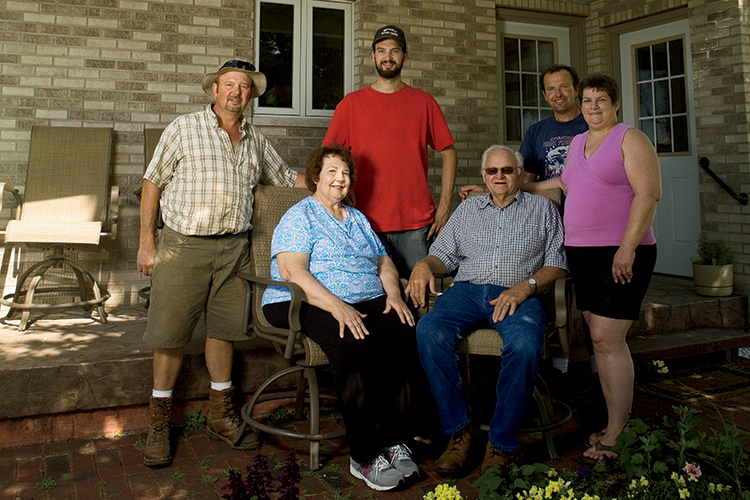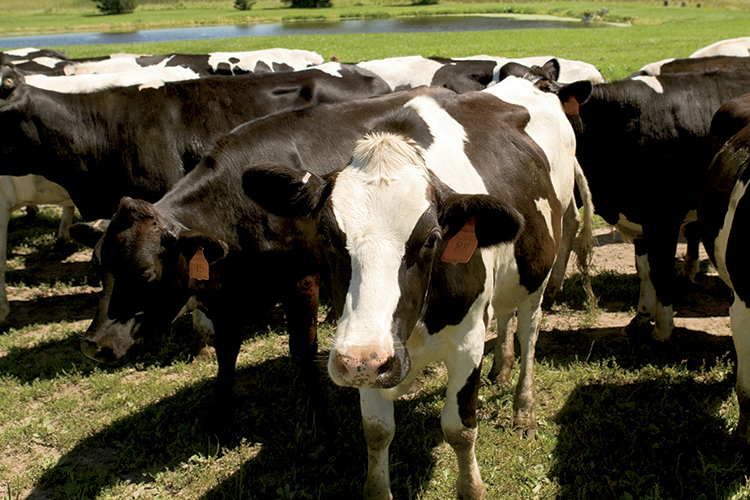Home > Wisconsin > Wisconsin Farm to Table > Wisconsin Dairy is a Family Tradition
Wisconsin Dairy is a Family Tradition
In partnership with: Wisconsin Department of Agriculture, Trade and Consumer Protection.

Front Row: Sandra and Richard Diedrich; Back Row: Son John, grandson Justin, son Philip and his wife, Kim.
Farming is a family affair for the Diedrichs, who have owned and operated a dairy farm in Twin Lakes for three generations and are still going strong.
Deep, Strong Roots
Edward Diedrich bought the farm in 1950, and in the 1970s, his son and daughter-in-law, Richard and Sandra Diedrich, took over. While Richard and Sandra continue to help out, their sons, Philip and John, primarily handle the farm’s day-to-day operations.
“I grew up on the farm,” Philip Diedrich says. “This is the only job I’ve ever had. I just enjoyed it when I was growing up and decided to continue it.”
Philip’s wife, Kimberly, and their three children – Abby, Shannon and Kyle – all work on the farm, as well as John’s son, Justin.
![Wisconsin milk [INFOGRAPHIC]](https://eadn-wc01-4177395.nxedge.io/wp-content/uploads/2020/05/Screen-Shot-2015-10-08-at-9.05.52-AM.jpg)
Although the farm has remained in the Diedrich family since day one, transferring control from one generation to the next hasn’t always been easy.
Fortunately, the Wisconsin Farm Center (WFC) within the Wisconsin Department of Agriculture, Trade and Consumer Protection working with the University of Wisconsin-Extension helped the family with their most recent transition plan.
“Frank Friar [with the WFC] was very helpful,” Philip says. “He helped answer a lot of questions because sometimes you wonder how you’re going to transfer the farm from one generation to the next, and if we had any disagreements, he would give us different options. He met with all of us individually and asked us a lot of questions to find out what everyone’s goals were, and he sat down with all of us together at the table, so we could discuss things openly. He kept us focused and on track, and it just made the transition a lot easier.”

Diedrich Dairy Farm
The 325-acre Diedrich family farm includes about 130 dairy cows that produce about 1,100 gallons of milk per day, as well as approximately 100 young stock that cannot yet be milked. The cows are housed in a free-stall barn, enabling them to move freely, and they have constant access to food and water. In addition, during warm-weather months, fans help keep cows cool.
“Our cows produce quite a bit of milk,” Philip says. “We focus on production because that’s where our livelihood is. We have to get a lot of milk out of the cows, which is all based on nutrition and cow comfort, and we want to make sure they’re happy – not just California has happy cows.”
According to Philip, the cows are milked twice a day, and the family maintains corn and alfalfa crops, which are loaded into silos and fermented into silage for cow feed.
![Wisconsin milk [INFOGRAPHIC]](https://eadn-wc01-4177395.nxedge.io/wp-content/uploads/2020/05/Screen-Shot-2015-10-08-at-9.06.05-AM.jpg)
“The cows eat a lot,” Philip says. “Our average cow eats over 100 pounds of food a day.”
The Diedrich family sells their milk exclusively to Oberweis Dairy, where the milk is bottled and delivered to homes or turned into ice cream.
“They [Oberweis Dairy] really focus on milk quality, and they cater to their customers with real high-quality milk,” Philip says.
The Diedrich family is showing no signs of slowing down, and Diedrich wants to see the farm continue to prosper, so the next generation can take it over when the time comes.
“It’s very important to us to keep the farm in the family,” Philip says. “We want to have it available for the next generation, so if they want to farm, they have the opportunity. It’s important that one generation helps out the next in order to keep it going.”



